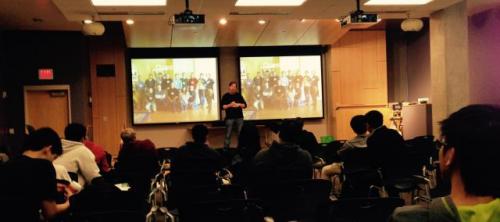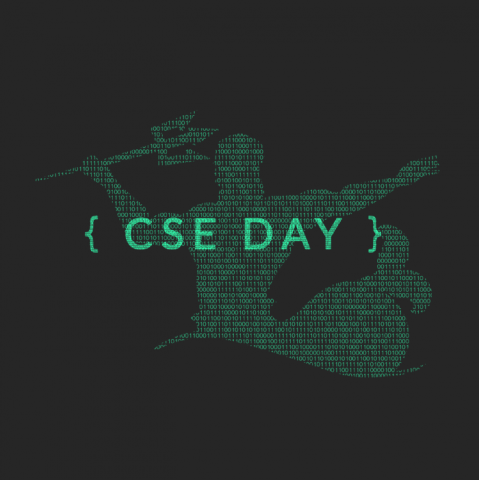
The Computer Science and Engineering Society (CSES) and its members turned out in force on Thursday, Jan. 22, for the 2015 version of the society's annual CSE Day event. Organizers estimate that roughly 250 students consistently attend at least one of the day's events (depending on their class schedules). Talks, activities and panel discussions throughout the day aimed to "inform students about the paths available to them in the computer science field by having them interact with students, alumni and faculty in the CSE Department, and members from industry." Sponsors of the event included Qualcomm, Microsoft, Google, ViaSat, and Visa (which also supplied one of its forensic investigators, John Camacho, to deliver a Tech Talk on enterprise-wide, risk-based security).
 Computer security was also on display when Prof. Stefan Savage (pictured at right) delivered a talk on "Buying Drugs for Science: Addressing the Economics of Cybercrime." Savage focused on the social and economic forces driving today's Internet attacks and deconstructing the underlying value chain for attackers. He sketched a picture of "economically-motivated, advertising-based e-crime." Savage and his collaborators spent roughly a year getting permission to use research funds to purchase $50,000 worth of counterfeit drugs and other merchandise sold through a patchwork of entities that make up the cyber-criminal ecosystem. The study, which included 600 orders of illicit drugs, turned up amazing evidence of the role that one type of pharmaceutical plays in the ecosystem: "Erectile dysfunction counterfeit drugs account for 75 percent of e-crime demand," said Savage, "and 80 percent of revenues." Tellingly, he added, between 20 and 40 percent of all sales of Viagra are ordered from consumers' spam folders, i.e., those consumers had to go into their spam folder to click on an offer of Viagra (usually at 20 percent of the regular price in the U.S.). The professor, who also directs the Center for Networked Systems, showed CSE students an example of ingenuity in packaging: the researchers received a shipment from Bangladesh that was supposed to have been for counterfeit RU-486 abortion pills. Instead they received an ornate woven textile that looked like a miniature carpet. With a little effort, they split apart the textile at the seams, only to find the pills stitched into the fabric.
Computer security was also on display when Prof. Stefan Savage (pictured at right) delivered a talk on "Buying Drugs for Science: Addressing the Economics of Cybercrime." Savage focused on the social and economic forces driving today's Internet attacks and deconstructing the underlying value chain for attackers. He sketched a picture of "economically-motivated, advertising-based e-crime." Savage and his collaborators spent roughly a year getting permission to use research funds to purchase $50,000 worth of counterfeit drugs and other merchandise sold through a patchwork of entities that make up the cyber-criminal ecosystem. The study, which included 600 orders of illicit drugs, turned up amazing evidence of the role that one type of pharmaceutical plays in the ecosystem: "Erectile dysfunction counterfeit drugs account for 75 percent of e-crime demand," said Savage, "and 80 percent of revenues." Tellingly, he added, between 20 and 40 percent of all sales of Viagra are ordered from consumers' spam folders, i.e., those consumers had to go into their spam folder to click on an offer of Viagra (usually at 20 percent of the regular price in the U.S.). The professor, who also directs the Center for Networked Systems, showed CSE students an example of ingenuity in packaging: the researchers received a shipment from Bangladesh that was supposed to have been for counterfeit RU-486 abortion pills. Instead they received an ornate woven textile that looked like a miniature carpet. With a little effort, they split apart the textile at the seams, only to find the pills stitched into the fabric.
Other activities during the day included Startup 101, a panel on the growing phenomenon of computer science and engineering-based startup companies. Speakers included Moxie Center executive director Jay Kunin, who mentors students in the 40 companies already admitted to the Moxie Incubator, as well as two student entrepreneurs: Chesong (Daniel) Lee, co-founder of the earphone company called Hush, which raised nearly $600,000 on Kickstarter versus the $100,000 they were seeking; and Joseph Le, a second-year computer science student whose company StudentHero connects high school students to summer internships.
 Another popular session was the Alumni Panel, which gaves current students an oppportunity to ask the alumni for tips on interviewing, presenting, seeking internships, and so on. Speakers included: Patrick Johnson (BS '07), now a software engineer at Google; Qualcomm staff engineer and CSE lecturer Garo Bournoutian (BS '05, PhD '14); McKenzie Velia (BS '13), who parlayed a summer internship to a year-long internship and most recently, a full-time job working on network security, all at ViaSat; and CSE Alumni Board member Justin Allen (BS '10), who recently joined WebAction, a Palo Alto-based company in the real-time data streaming space.
Another popular session was the Alumni Panel, which gaves current students an oppportunity to ask the alumni for tips on interviewing, presenting, seeking internships, and so on. Speakers included: Patrick Johnson (BS '07), now a software engineer at Google; Qualcomm staff engineer and CSE lecturer Garo Bournoutian (BS '05, PhD '14); McKenzie Velia (BS '13), who parlayed a summer internship to a year-long internship and most recently, a full-time job working on network security, all at ViaSat; and CSE Alumni Board member Justin Allen (BS '10), who recently joined WebAction, a Palo Alto-based company in the real-time data streaming space.
Among their recommendations in response to student questions:
- Go to career fairs.
- Get involved in student organizations (and student government, as Garo Bournoutian did as president of the Graduate Student Association).
- Make yourself known to faculty members; they are often asked to recommend a student for hire.
- Participate in the Jacobs School's Team Internship Program (like McKenzie Velia did at ViaSat).
- Attend any event where you can get feedback and critique of your resume.
- Consider studying a year abroad, preferably as a sophomore. (Justin Allen spent his year abroad in Scotland, and it was invaluable.)
- Become a CSE Tutor: it's rewarding and looks great on your resume.
CSE Day 2015 also included a panel featuring recruiters, and a panel of undergraduate students who have done recent internships. Taylor Fah is a fourth-year major in computer science, who talked about his experience interning two years in a row at Texas Instruments. Winnie Xu is a third-year CS major who worked at Yahoo! last summer as a front-end web developer. Jesse Gallaway is a second-year undergrad who did an internship at Qualcomm in 2014 and who will intern at Google this summer. Finally, also a second-year CS major, Stanley Yip was recruited at the DECaF career fair in 2014 and did his internship last summer at ServiceNow, which gave him the opportunity to learn JavaScript, HTML and CSS entirely on the job.
The day of activities ended with the popular Jeopardy event, which pits faculty (Rick Ord and Leo Porter) in a game of computer-science savvy against students eager to win prizes ("some free swag")..

